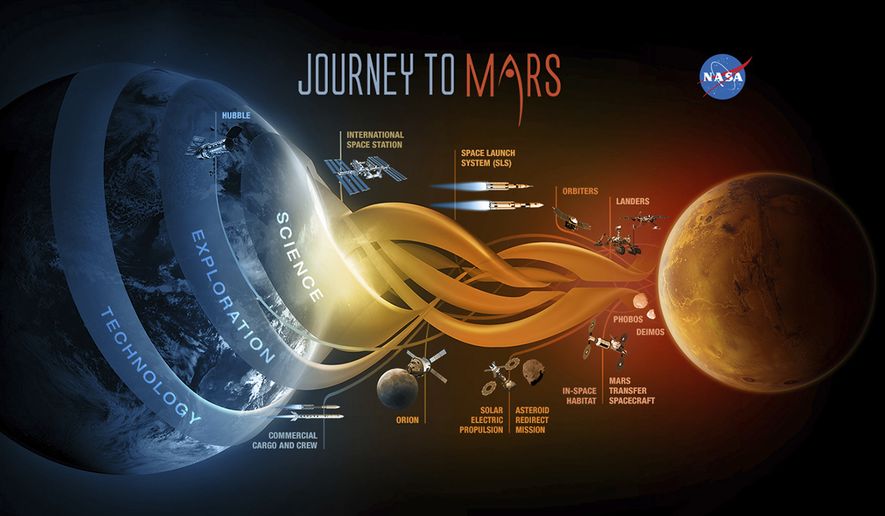President Obama set a goal last week of landing a manned mission on Mars by the 2030s, but space exploration advocates say they have no clue whether the next president is prepared to follow through on that goal.
Indeed, other than a drive-by shoutout to the space program when they campaign in Florida, the candidates have been silent about their vision for NASA, a nearly $20-billion-a-year agency that is responsible for a large portion of federally funded science research in the U.S.
“In a sense, it’s disappointing that science and space science and space exploration isn’t a bigger issue, but at the same time, it’s kind of a good thing that one side isn’t talking about it and riling up, creating division between it by embracing it,” said Casey Dreier, director of Space Policy at the Planetary Society.
To the extent Hillary Clinton, the Democratic nominee, has mentioned the U.S. space program on the campaign trail, she has been generally supportive.
In a recent set of answers for an article in Space News magazine, Mrs. Clinton said it is critical to ensure that NASA has the “resources and the predictable funding” it needs to achieve its goals.
“I don’t have an objection to partnering with commercial enterprises, but I just think they are more in the applied science arena — not in the discovery and research arena that I think only the government can support,” she said at a town hall event in New Hampshire in December.
Mr. Trump, meanwhile, has said he loves NASA and what it stands for but that the country has to take care of other issues first.
“In the old days, it was great,” he said in response to a boy’s question about NASA in New Hampshire in November. “Right now, we have bigger problems, you understand that. We got to fix our potholes. You know, we don’t have exactly a lot of money.”
In the Space News article, Mr. Trump said he would examine spending priorities and make adjustments as necessary. He pledged repeatedly to work with Congress on the issue.
NASA and space exploration were marquee endeavors for the U.S. from the 1960s through the 1980s but have gone adrift with the retirement of the space shuttle program and the search for affordable missions.
Former House Speaker Newt Gingrich tried to reinvigorate the debate during his 2012 presidential run by proposing moon colonies. His plan backfired.
“He just took it too far, and three days later it was a ’Saturday Night Live’ skit and the issue blew up on us,” said Dale Ketcham of the group Space Florida. “And Mitt Romney just put a bullet in the head of that issue, saying that he would fire anybody that came to him with a $100 billion moon project.”
Still, Mr. Ketcham said space is an issue for constituencies in Ohio, Virginia and Colorado, which all have a space presence, in addition to Florida, where the area around Kennedy Space Center is known as the Space Coast.
In an op-ed published last week, Mr. Obama laid down a goal of sending humans to Mars by the 2030s.
But his administration has had a mixed approach to the space program. He pushed to shut down the Constellation program, which was intended to be the successor to the manned U.S. space shuttle program. His fiscal 2017 budget proposal for NASA was $300 million less than the agency received the previous year.
President George W. Bush thought space could be a political winner. He kicked off 2004, his re-election year, by calling for Americans to return to the moon by 2020 and use it as a springboard to Mars. But tightening budgets and two wars derailed his vision, and he quickly shelved his plans.
President Bill Clinton took a “steady as it goes” approach to space during the 1990s, said Jim Kirkpatrick, executive director of the American Astronautical Society.
“So what would Hillary Clinton do? Knowing her background and statements we’ve seen, I suspect in general, she’s supportive of a strong space program,” he said.
Mr. Kirkpatrick did point out Mr. Trump’s pothole prioritization remark but said ensuring a strong space program could fit into his campaign theme of “Make America Great Again.”
“Are we really great if we give up our [prominent] role in space to other countries and let China kind of take it from here or cut back on major programs?” he said. “It just seems like that wouldn’t fit into his big plan.”
Space News asked Mrs. Clinton and Mr. Trump whether they support NASA’s plans to send astronauts to an asteroid in the mid-2020s and to send astronauts to Mars in the 2030s.
Mrs. Clinton gave a cautious response, saying asteroids are “valuable targets for further exploration” and Mars is a “consensus horizon goal.”
Mr. Trump, meanwhile, said he would figure things out — after he’s elected.
• David Sherfinski can be reached at dsherfinski@washingtontimes.com.




Please read our comment policy before commenting.